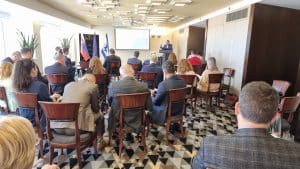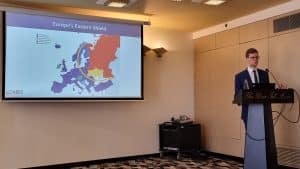It is one year since the Russian invasion of Ukraine.
- On February 24, 2022, Russia has made good on its threat when its army embarked on a substantial military campaign in Ukraine, invading its sovereign territory in what has been framed as the largest-scale interstate act of conventional warfare in Europe since the end of World War Two (if the Yugoslavian War is to be considered as a civil war).
- The two countries have each suffered more than 100,000 casualties, along with thousands of tanks and other armored vehicles lost. Russia has failed to achieve its main objectives: to conquer Ukraine, overthrow its government and alienate its neighbor the European Union and the Atlantic Alliance. When its original plans for a “blitzkrieg” failed in March 2022, Russia shifted its strategy. A shocking war of attrition with indiscriminate violence against civilians became a key tactic, as Russian forces have initially succeeded in taking control over large swathes of Ukraine, including the Donbas region (in eastern Ukraine) and large cities such as Kherson and Mariupol, even seriously targeting the capital Kyiv. Russian President Vladimir Putin vowed a war of “denazification” against the neighboring Ukraine, considering it “an integral part of our history”, later annexing to Russia four separatist regions in eastern Ukraine – Donetsk, Luhansk, Kherson and Zaporizhia, pledging to “defend our land with all our strength and all our means”.
- Almost one year later, the nation’s total mobilization for war and the steadfast resistance put up by the Ukrainian people and army have proven invaluable. However, Ukraine’s future appears ever more fragile. The Ukrainian side has endured destruction of infrastructure and urban environment on an unprecedented scale.
- About 16 million Ukrainians have had to leave their homes, triggering a refugee crisis and humanitarian disaster impacting Europe, with its ripples reaching as far as Israel. Over 50 percent of Ukraine’s energy infrastructure has either been destroyed or damaged. Ukraine’s economy has shrunk by roughly 30 percent, and more than 30 percent of its population has been displaced.

IDSF-Habithonistim held a conference co-organized with NATO’s presidency in Israel, the Embassy of Slovakia, to mark the 1-year anniversary to the war in Ukraine. Austria Institute for Europe and Security Policy (AIES) from Vienna participated in this conference to present the European angle.
Left to right: Or Yissachar, IDSF Head of Research; Michael Zinkanell from AIES; Ambassador Danny Ayalon, IDSF member; Dr. Anat Hochberg Marom; Igor Maukš, Ambassador of Slovakia in Israel


Global ramifications
- This war has been described as a pivotal moment in time, disrupting the post-WWII world order while calling for a rethinking of the European Union’s defense strategy and security architecture. It has placed an ominous question mark over the West’s resolve, under US leadership, to defend its allies as well as the resilience of the NATO Alliance in case of a similar assault against one of its member-states. This is a complicated event, requiring caution on the part of all responsible parties in the international arena, particularly when nuclear-armed powers are taking center stage.
- This war has taken a knock-on effect on the global economy due to the unprecedented sanctions the West has imposed on Russia, the disengagement from joint energy projects with Russia including the halting of the Nord Stream 2 gas pipeline project from Russia to Central Europe. This might also result in oil gradually being traded in other currencies than the US Dollar (such as the Chinese Yuan or the Russian Ruble). All these factors could lead to a substantial degradation of the international leverage the United States currently holds. The sanctions imposed on Russia have not only caused the value of the Ruble to plummet, although in the meantime it has recovered to its pre-invasion value, but they have also had a boomerang effect on the oil prices in the West, which might further exacerbate the already severe economic crisis in North America and Europe. These severe sanctions have placed Russia in a position where it has very little left to lose, and it is being maneuvered into a corner; Russian President Putin has already referred to these sanctions as a “declaration of war”.
The war in Europe poses challenges as well as considerable threats to Israel alongside exceptional opportunities. These are as follows:
- The Relationship with Russia: Israel stands with Ukraine and with the Western world against the Russian invasion. Nevertheless, it finds itself in a complicated situation in which it must address other critical considerations as well. Russian forces are deployed in Syria, where the Israeli coordination with Russia is important for maintaining Israel’s ability to thwart Iran’s efforts to entrench and build its capability to harm Israel directly and through supplying advanced weaponry to Hezbollah. Israel also has to bear in mind the well-being of the Jewish community in Russia.
Faced with requests to supply Ukraine with state-of-the-art Israeli weaponry, Israel adopted a cautious approach to avoid the possibility such weapons falling in the hands of its adversaries.
- The Relations with the United States: Senior officials in the US State Department have already expressed their expectation that Israel take sides and join the international anti-Russian sanctions and provide Ukraine with security-related assistance, beyond the humanitarian level, as well as siding with those condemning Russia in the United Nations. Israel has partially agreed to these requests, but the question of supplying military assistance is yet to be decided upon.
- The genuine value of international guarantees: Experience has shown that the guarantees given by the signatory countries to the 1994 Budapest Memorandum (the US, Russia, and the UK), which all committed to Ukraine’s independence, sovereignty and non-belligerence against it, have not deterred Russia from invading. That, despite the fact the Western military assistance has been proven invaluable in keeping Ukraine’s stance against Russian attacks, and that the West has imposed unprecedented economic sanctions against Russia which have been a major sign of support.
The clear lesson for Israel is that there is no international force or guarantee that will vouch for Israel’s security. Contrary to the “end of history” concept which has dominated Western academic elites following the end of the Cold War, war is a human cultural act which has beset mankind since antiquity, and it is not going anywhere. A country unable to guarantee its own security cannot exist, certainly not in a case like Israel. Therefore, Israel has to rely on itself alongside Western support to be able to defend itself by itself.
- The Iranian angle: The war has strengthened Russian-Iranian relations
Iran has become a direct participant in the war. By that, they support their goal of changing the world order through their alliance with major powers who share the same objective. Iran tries to lever its involvement and its support to Russia to gain momentum in its effort to become a nuclear threshold state on its way to become a nuclear power. Iran expect Russia to reward it for its participation in the form of advanced weaponry that would help it deter and foil attempts to stop its effort to obtain nuclear weapons.
Iran can draw two main conclusions from the Ukrainian case.
- In terms of their nuclear pursuits, it is evident that countries such as Ukraine and Libya, which relinquished the nuclear arsenal they had possessed, or the nuclear program they had been operating, also lost a meaningful security guarantee. In effect, they lost the key to the survival of their regime and for securing their national interests. From Iran’s perspective, this is irrefutable proof that it is quintessential it accelerates its nuclear program.
- With respect to its malign activity around the Middle East, the inadequate international response to the war in Ukraine is a de-facto green light for Iran to increase its aggressiveness in the region, in default of a “price tag” being exacted from it by the international community beyond condemnations or sanctions. Knowing that the implications are going to be marginal if not negligible, the West’s “red lines” have proven to be pale and ineffective time after time – whether in the case of the chemical weapon attack in Ghouta, Syria in 2013, or in the case of the war Russia has been waging against Ukraine.
- Drones: About 1,700 Iranian drones have so far apparently aided Russian attacks on civilian infrastructure in Ukraine.
Tehran has now become Moscow’s most important military supplier, so much so, that Russia and Iran are now moving forward with plans to build an Iranian-designed drone factory on Russian territory. Such a facility could reportedly produce up to 6,000 Iranian-designed drones over the next few years which would dramatically increase Russian striking power.
- Economy: Moscow and Tehran have also taken a key step towards linking their banking systems, boosting cooperation in the face of Western sanctions. Iran’s SEPAM – the national financial messaging service – is now connected to Russia’s equivalent of SWIFT (SPFS). In an initial response to the Ukrainian invasion, Western countries banned key Russian banks from the SWIFT system. Now, however, all of Iran’s several dozen financial institutions can connect with Russian banks.
President Putin’s visit to Iran in July 2022, a rare occasion given the scarceness of his foreign trips since the outbreak of the war, has been viewed as a significant tribute to the Iranian regime in its effort to bolster the Russian-Iranian axis. During the visit, Russian energy giant Gazprom and the National Iranian Oil Company have also signed a 40-billion USD MoU, boosting Moscow’s investment in oil and gas in Iran ten-fold from just 4 billion USD in 2021. Iran holds the second-largest gas reserves in the world after Russia.
- Strengthening regional alliances in the Middle East: The Russian-Iranian bond is a clear sign for the West to further advance the Abraham Accords in the form of a Western-Israeli-Moderate Sunni alliance. Seizing this opportunity would combine several advantages at once:
- Keeping moderate Sunni states, fearing for Western appeasement, closer to the West rather than opening up to Russia, China and Iran;
- Expanding Israeli-Arab peace to Saudi Arabia, already signaled as one of the current Israeli government’s main objectives;
- Forming an ever-more unified front in the face of a more aggressive Iran that tests the West with more daring Uranium enrichment and regional interference. On top of its suppression protesters and progress with its nuclear program, the West can find Iran’s support for Russia as a clear sign to be more actively involved in the counter-Iranian axis in the Middle East.
- Strengthening Israel’s global position: The European and American partial reliance on Russian gas, along with imposition of severe economic sanctions, presents Israel with a once-in-a-lifetime opportunity to increase its gas exports to Europe and the rest of the world from its Mediterranean gas fields. At the same time, Israel is positioning itself as a regional economic power and a global technology-security hub, comfortably placed within the European security space, which is being redrawn in view of the events in eastern Europe. This also provides Israel with diplomatic leverage toward Europe, which could be used to place political equations in return for energy and security aid.
- Opportunity for strengthening Israel’s identity as a national homeland for the Jewish people: This far-reaching occurrence requires Israel to absorb thousands of Jewish immigrants (Olim) from Ukraine, Russia and East Europe, being the only place in the world that provides guarantees for the security and safety of Jews. This move would also bolster Israel’s national resilience, in the same way as the transformative effect the immigration from the disintegrating Soviet Union had in the 1990s.
- Reaffirmation of the understanding that Israel has got to continue to rely on the “Citizen-Soldier Military” model, which is an indispensable prerequisite for our national resilience, allowing for mass mobilization and a steadfast footing to confront any existential threat.
The Citizen-Soldier Military is a vital organ of any nation state due to the injective symmetry between the military and the culture, between the military and society. The degree of motivation each citizen feels to take part in the sacred mission of defending the country is at its height, especially when compared with professional-volunteer militaries.
The war in Ukraine brings the strength of the popular resistance into extremely sharp relief: while the Ukrainian military relies on civil mobilization, most of it took up arms just shortly before the current flare-up.
The citizen-soldier military is clearly superior in comparison with professional-volunteer militaries:
- Ability to mobilize a large mass of soldiers in an emergency
- Reserves, which make up a decisive force both defensively and offensively
- The principle of the “fight for our home, from our home”, which is key to the willingness to mobilize
However, in this post-modernistic day and age, the concept of the “Citizen-Soldier Military” has lost a lot of ground in favor of the scaled-down, professional forces operating under the principle of mutual defense treaties. Add to this a prevailing school of thought that a professional military is less costly in economic terms while operationally it is more highly-skilled.
The “professional military” concept has been exposed as irrelevant in the current war in Ukraine. While this country is fighting against a vastly larger enemy than itself – no other country in Europe has come forward to stand by its side with actual combat support. In effect, the fact that Ukraine has been left to fend for itself only reinforces the fact that it should have relied on its civilian citizens.
NATO, as an opposite example, requires its member states to rely on professional militaries. This way NATO supposedly maximizes its mutual defense treaty, however behind this concept is also a hidden motive – a professional military is an opportunity for a Western policy to make a state capable of withstanding an onslaught against it, if that country fulfills the terms dictated by the West. This way the West gains effective control over a country, over its political trends, and over its room to maneuver in the face of security threats: as long as that country does not toe the line of political interests as the West sees them – that country cannot be accepted into this “elite club of nations”.
The ability of a nation state to stand on its own is a paramount value: this is a cultural ethos of the highest order. Above and beyond this it is a prerequisite for social cohesion, which in turn is a cultural basis for robust national strength. The intensity of the Ukrainian resistance, which relies on a broad base of civilian mobilization, is the “X-factor” in this current fighting – without mobilization of the citizenry Ukraine would not have been able to hold back the Russian onslaught with its military, which is superior in every conceivable way.
The war in Ukraine is an unmistakable example of the need for a citizen-soldier military, especially in a nation-state, and all the more so in a country which is subject to an existential threat. The “fighting people” ethos we are familiar with in Israel is the core of national strength in its military contexts. Thus, a country subjected to a substantial threat can quickly ramp up its order of battle to face any threat.
Another point this war highlights is the need for a well-trained, skilled military reserve. It does not have to be much more fit than the level enabling it to operate correctly from the tactical standpoint, where from the operative standpoint it can form a mass that can be translated into quality. The citizen-soldier military is a condition for coping with such challenges, and beyond that, it is also the most fitting model for a democracy – due to the very fact that the people are the military, and the military is the people. Ultimately, this is the most powerful force in the state, which is in the hands of the masses – it cannot get any more democratic than that.
The idea that a salaried or professional army can provide a solution in the face of existential security threats is decidedly baseless. People are not going to take any meaningful risks with their lives for money. National resistance cannot be made with money – this is a values-based issue. It is reliant on social solidarity. Israel’s experience has time and again proven that reliance on the citizen-soldier military has been an indispensable asset in its handling of such threats, overcoming them, while still enabling subsequent social growth. Whenever we have deviated from this precept – our achievements on the battlefield have diminished, and so has our social cohesion.
- Classic wars are not a thing of the past, requiring adequate military force build-up: While Israel’s main challenges today are combating sub-state terror groups such as Hezbollah and Hamas, which are armed to their teeth with ground-to-ground missiles that can hit Israel’s civilian population and strategic facilities in the home front; Iran’s advance toward nuclear weapon; cyber; and other domestic security challenges, Russia’s classic use of brute force reminds the IDF that ”classic wars” are not a thing of the past, and that it should retain capabilities to confront mass movement of forces as well.
